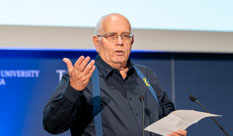More:
News & Stories
A Policy-Setting Workshop on Non-Ionizing Radiation at HIT
In light of the growing use of communication technologies in the 21st century, experts, private individuals, and society as a whole must face the challenge of the impact of these technologies on different aspects of our lives. These issues include the following questions: How can we evaluate the risks posed by radiation-emitting technologies? How should we go about setting policy in this field? What impact do different groups in society bear on this process? What is the media's role? Is there room for public debate?

On Thursday, 6.18.15, for the first time in Israel, a workshop took place at HIT, aiming at introducing and investigating pressing issues concerning non-ionizing radiation, which require immediate policy-setting and action.
The diverse range of positions presented at the workshop titled "Connecting and Impacting: Technology Through the Eyes of Interested Parties" will be collated as a reference booklet and presented to policy-makers. The workshop, which was attended by Mr. Yaakov Litzman, the Deputy Minister of Health, was launched by the Tnuda Center, acting in collaboration with the Gertner Institute and HIT, the Holon Institute of Technology.
The workshop provided a space for a unique and fascinating multidisciplinary intersection of different worlds (health, science, ethics, law, economy, media and more) and interest groups (the public at large, policy-makers, the scientific community, the business sector, the public sector, environmental activists and more).
During the workshop, different significant issues were discussed, with the goal of balancing the conflicting considerations that go into setting policy in a field plagued by scientific uncertainty, where the precise level of risk cannot be easily determined. Through a group discussion of the non-ionizing radiation issues at stake, participants sought to lay the foundations for expanding their capacities in this complex decision-making procedure.
Workshop members were divided into four groups, each of which dealt with the implications for individuals and the public of one of the following four significant aspects:
-
Coping with changing technologies
-
Using communication technologies in the school setting
-
Communication technologies in the public space
-
Communication technologies from a broad health and behavior perspective
The diverse range of positions presented at the workshop will be collated in a booklet of recommendations for public policy and presented to policy-makers.
The Tnuda Center – The Israeli National Information Center for Non-Ionizing Radiation
In January 2013, a government mandate led to the founding of the Tnuda Center – a national information center about non-ionizing radiation and its impact on public health. Tnuda is supported by a research and physical infrastructure based at the Gertner Institute in Tel-Hashomer Hospital as well as by HIT, the Holon Institute of Technology.
The center is headed by Prof. Sigal Sadetzki, director of the Cancer Unit of the Gertner Institute for Epidemiology and Health Policy Research. She is joined by Prof. Motti Haridim, Vice President of Academic Development at HIT, a senior researcher in the fields of engineering and technology, and Dr. Sharon Furman-Assaf from the Gertner Institute, a senior researcher in the fields of epidemiology and public health.
The Tnuda Center is funded by the Ministry of Science, Technology and Space, and by the Ministry of Environmental Protection, and is guided by a steering committee as specified by its founding governmental mandate.
- News & Events
New Collaboration with Sheba Medical Center will qualify nurses to work in a digital environment.
Collaboration between HIT Holon Institute of Technology, the teaching authority of the Sheba Medical Center, and the Sheba-BEYOND virtual hospital will allow training nurses in Israel and around the world to work in a digital...



 Additional programs
Additional programs
